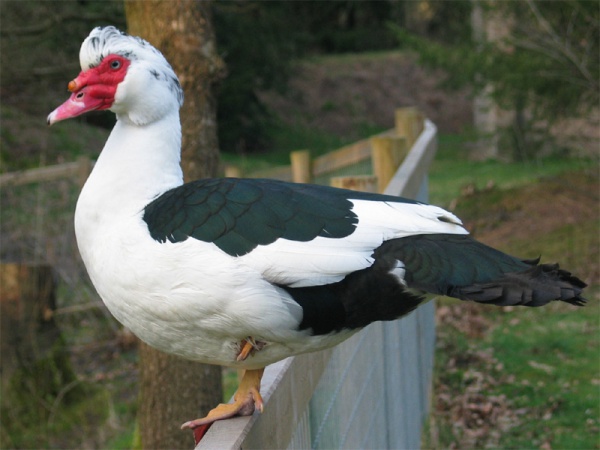Facts About Muscovy duck
The Muscovy duck is a large waterfowl native to Mexico, Central, and South America. There are also smaller wild and feral populations in regions such as the United States, Europe, New Zealand, and Australia. Male Muscovy ducks are larger than females, with some weighing up to 7 kilograms. These ducks exhibit predominantly black and white plumage, with males showcasing glossy, iridescent feathers on their backs. They are quite hardy and can withstand temperatures as low as -12°C.
The domesticated variant, known as Cairina moschata domestica, has been bred since pre-Columbian times by Native Americans. These domesticated ducks are heavier and less capable of flight compared to their wild counterparts. Muscovy ducks feature long claws on their feet and wide, flat tails. Wild Muscovy ducks are primarily black with significant white patches on their wings. They were first described by Carl Linnaeus in 1758 and are now classified within the dabbling duck subfamily, Anatinae.
These ducks are non-migratory and are typically found in forested swamps, lakes, and streams. Their diet is varied, consisting of plants, small fish, amphibians, and insects. During the breeding season, they lay between 8 to 16 eggs, which require about 35 days to hatch. The ducklings are quite self-sufficient and can feed on grains, insects, and grass immediately after hatching. In urban and suburban areas, feral Muscovy ducks can sometimes become a nuisance.
Domesticated Muscovy ducks, often referred to as "Barbary ducks" are farmed primarily for their meat, which has a more robust flavor compared to other domestic ducks. They are also quieter. These ducks can be crossbred with mallards to produce hybrids, such as the mulard duck. Their meat is lean and tender, often compared to veal, and they are also utilized in the production of foie gras.
Interestingly, Muscovy ducks are used in homeopathic treatments and are sometimes bred with mallards to produce kosher duck products in Israel. The kosher status of Muscovy ducks has been a topic of rabbinic debate. Studies indicate that Muscovy ducks are more susceptible to blood parasites than many other bird species.

 Brazil
Brazil